Donald Trump has two clear structural advantages going into this year’s election. History shows that incumbent presidents have a distinct edge over their challengers, and the electoral college currently over-represents Republican-leaning states. But beyond these built-in factors the picture is unclear. Certain trends point to a Democrat triumph in November, while others point to a victory for Trump. How the president deals with current challenges will also influence the outcome.
The president’s approval rating suggests that the Democrats will win this autumn. Unlike every other post-war president – including one-termers such as Jimmy Carter and George H.W. Bush – Trump’s net approval rating has been negative throughout his presidency. This strongly implies that a majority of American voters are beyond his reach.
Of course, you could retort that Trump’s social base has held up remarkably well and he doesn’t need to win the popular vote to be elected, as 2016 showed. But alongside Trump’s negative net approval rating, two developments signal that pivotal swing voters will break for the Democrats this time round.

